Hanyang University’s Unification Education Leading University Project hosts a public forum on walking with North 토토사이트 롤링 defectors
In honor of North 토토사이트 롤링 Refugees Day, the event seeks new directions in policy, awareness, and institutional reform
“Beyond policy, toward coexistence”—rethinking how to live together with North 토토사이트 롤링 defectors
The 2nd Academic Conference Celebrating North Korean Refugees Day was held on July 16 at the Korea Press Center in Seoul. Co-hosted by Hanyang University’s Unification Education Leading University Project, the Ministry of Unification, and the Korean Association for North Korean Studies, the event marked the official commemorative day for North Korean defectors (July 14). Under the theme “Walking Together with North Korean Defectors: Diagnosing Issues and Seeking Improvements,” participants examined current policy and proposed institutional reforms.
In his opening remarks, Kang Jong-seok, Director-General of Humanitarian Cooperation at the Ministry of Unification, emphasized the need for policies that promote both independence and integration for North Korean defectors. “Beyond basic resettlement support, we will seek ways to help them become active members of their communities,” he said. Park Hyun-sun, president of the Korean Association for North Korean Studies, described the event as “a model case of public-private cooperation, jointly planned by policy institutions, research bodies, and frontline practitioners.”
Hong Yong-pyo, professor of political science and international studies and director of the Unification Education Project at Hanyang University, stated that walking alongside North Korean defectors “begins with standing face to face.” While hospitality can be a passive gesture, he explained, “walking together” means engaging in mutual understanding and shared action. He added that this mindset is essential to viewing defectors not as subjects of protection but as equal members of the community.
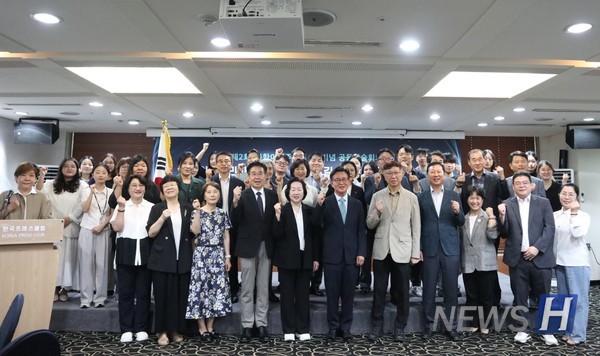
Session 1: Shifting family structures—North Korean women and their children born in third countries
The first session featured a presentation by Dr. Kim Hyun-a (Gyeonggi Provincial Government) titled “Family Integration Policy from a Maternal Perspective.” She noted that approximately 72% of North Korean defectors are women, many of whom are raising children born in third countries without spouses. These children often experience identity confusion, educational disruption, and institutional exclusion, which Kim attributed to the system’s focus on conventional family models. “Family is the structural bridge to independence and local settlement,” she emphasized, calling for policies centered on women’s lived experiences.
During the discussion, panelists highlighted the need for women-centered support and diverse family policies. Park Hyun-sook, director of the Gangwon Southern Hana Center, noted the isolation faced by middle-aged single male households and advocated for inclusive approaches spanning gender and life stages. Hyun In-ae, director of the Korea Institute for Future Women and the Korean Peninsula, emphasized the importance of recognizing North Korean women’s dual burdens of caregiving and breadwinning. Yoon Sang-seok (Coexistence Plan) and Professor Jeon Jeong-hee (Ewha Womans University) proposed concrete steps to support multi-generational households and third-country-born children.
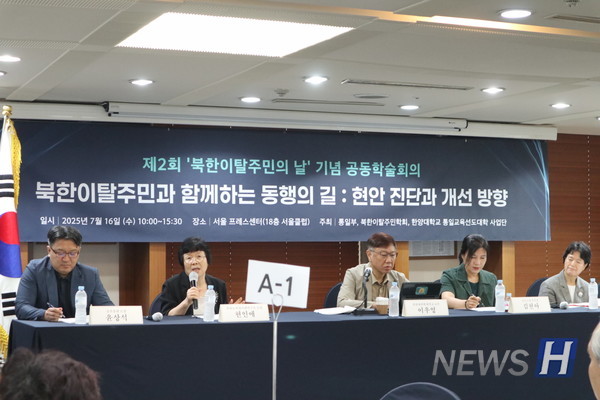
Session 2: Identifying at-risk households and improving the social safety net
The second session featured Professor Mo Chun-heung (Peace Research Institute), who addressed the issue of strengthening social safety nets for at-risk North Korean defector households. Citing the 2019 tragedy involving a defector mother and son, he pointed out flaws in the nationwide inspection system, including mismatched addresses and restricted access to personal information. “We need to broaden the scope of target populations and actors involved, and strengthen information-sharing mechanisms between the public and private sectors,” he argued.
The discussion explored practical challenges in service delivery. Kim Sun-hwa (Macheon Social Welfare Center) emphasized the need for stronger inter-agency cooperation. Kim Seong-nam (Hana Center, Western Gyeonggi Province) shared cases of isolated households and stressed that “sometimes, what matters most is one person knocking on the door.” Cho Sung-eun (Korea Institute for Health and Social Affairs) and Kim Seong-mo (North-South Hana Foundation) called for decentralizing the current top-down structure and expanding the role of local governments and civil society.
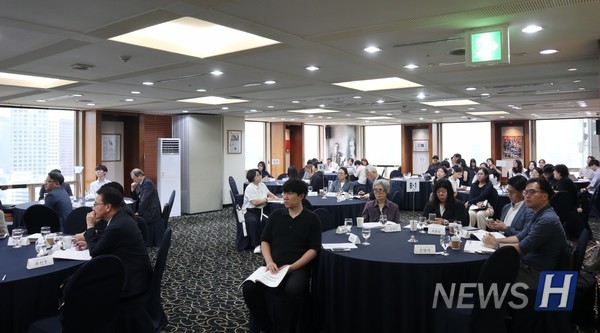
The lack of a robust safety net is often tied to a lack of public awareness. For those who have lived in isolation, integration into the local community requires not only institutional support but also social understanding.
Session 3: Recognizing North 토토사이트 롤링 defectors as citizens
In the third session, Professor Park Jae-in (Konkuk University) presented on “Improving Public Perception and Promoting Social Integration of North Korean Defectors.” He noted the inconsistent use of terms across government ministries—such as “North Korean youth,” “students from a North Korean background,” and “youth with a migrant background”—which hinders both data collection and policy coordination. He stressed that perception change should not be framed as an act of sympathy but as a measure of societal inclusivity.
Panelists discussed language standardization, media portrayals, and the importance of seeing defectors not as policy subjects but as full citizens. Kim Ellen (Vice President, Korean Association for North Korean Studies) emphasized that policies should aim not at helping defectors adjust, but at maturing society itself. Ryu Ji-seong (Korea Legislation Research Institute) echoed the call for a shift in perception—from viewing defectors as exceptional individuals to fellow citizens. Attorney Lee Young-hyun and Peace Agora Director Cho Kyung-il emphasized the need to increase everyday contact and communication within local communities to combat prejudice.
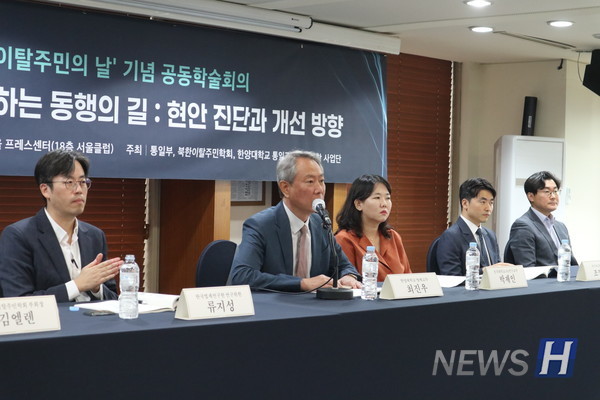
“Beyond policy: walking together in everyday life”
Held in recognition of the legal commemorative day for North Korean defectors, the conference served as a platform to explore how defectors can be embraced not as beneficiaries of protection but as equal members of society. A shift in perspective—from seeing them as policy subjects to neighbors—is the central theme that ran throughout the event.
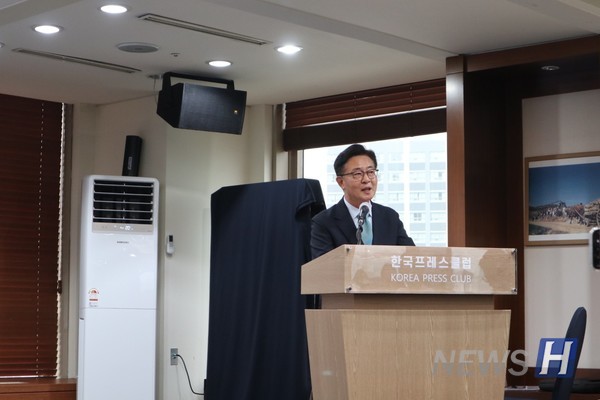
Professor Hong added, “When the todays we share add up, we will eventually cross the divide. Integration must be realized not through slogans but through real lives.” The diverse voices of practitioners, researchers, and policymakers all pointed in the same direction—toward walking together. It is hoped that the discussions begun at this conference will lead to sustained policies and practices that support long-term coexistence with North Korean defectors.

 '한양위키' 키워드 보기
'한양위키' 키워드 보기